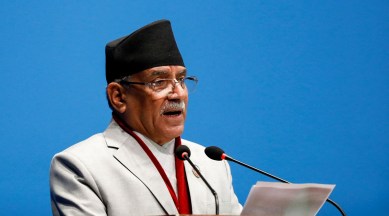Stay updated with the latest - Click here to follow us on Instagram
Nepal presidential polls today; all eyes on hearing for pleas seeking PM’s trial
Ram Chandra Poudel, backed by Maoists, Nepali Congress and their allies – appears way ahead of his rival Subhash Chandra Nembang, but chances of 'cross voting' cannot be ruled out, election observers say

Nepal gears up for the third presidential polls on Thursday amid growing fears of another political uncertainty in the Himalayan nation.
Around 880 members – 332 from two houses of Federal Parliament and 550 from State Legislature – will be casting their votes from two booths set up in the Parliament House in Kathmandu in a five-hour exercise beginning 10 am Thursday. However, all eyes are on the Supreme Court, just about a km away from the poll venue, where a writ petition to try Prime Minister Pushpa Kamal Dahal aka Prachanda in a mass murder case during the insurgency is slated to be heard, amid protests by the Maoist Centre and the Nepali Congress, the two allies in the presidential poll.
Ram Chandra Poudel of the Nepali Congress and Subhash Chandra Nembang of the Communist Party of the Nepal-Unified Marxist Leninist – are running for the Presidential post that will be determined by the federal and provincial legislators.
According to the Election Commission, the results will be known on Thursday itself. The winner will be succeeding Bidhya Devi Bhandari, who relinquishes her post on March 13.
Poudel – backed by Maoists, Nepali Congress and their allies – appears way ahead of his rival, but chances of ‘cross voting’ cannot be ruled out, election observers say. The pro-monarchy Rastriya Prajatantra Party, which has 14 members in Parliament and 28 in provincial legislature, has decided to boycott the presidential poll.
The Vice President will be elected within a week after the presidential election. Though the presidential election has brought the Nepali Congress and the Maoists together as the latter parted ways with the UML, the fact that 28 Nepali Congress activists filed the petitions seeking Prachanda’s trial in the mass murder case in the Supreme Court, has injected uncertainty and fragility in the equation.
At least 17 relatives and family members of the petitioners had been killed, some of them gruesomely, during the Maoist insurgency led by Prachanda between 1996 and 2006 and they refused to obey the “informal instruction” of the party leaders not to go against the Maoists at the moment.
If the Supreme Court decides to go ahead with the case, the demand for Prachanda’s resignation as Prime Minister will grow, which may derail not only the current political equation but also adversely affect the peace accord which pledged to investigate, identify and punish the guilty of human right violations during the conflict, something that the successive governments after 2006, the year accord was signed, did not pursue seriously and honestly.
A group of Maoist parties, now split into more than half a dozen groups, saw it as a conspiracy by the Supreme Court and they warned that they will fight any move to criminalise Maoist politics and the ‘people’s war’. Former Prime Minister and head of the ‘Jana sarkar’ ( Revolutionary People’s Council) during the conflict, Baburam Bhattarai, said ‘to have a sitting prime minister dragged to the court is unthinkable’, while some other leaders saw a larger conspiracy by the court itself to derail the peace process.
Meanwhile, just an hour before the presidential poll begins, a national movement seeking restoration of Nepal’s ‘Hindu Kingdom’ status, is likely to be announced. “We demand restoration of a non-partisan monarchy as the guardian of the nation that is diverse in geography, faith and ethnicity,” Durga Prasai, convener of the movement, said.